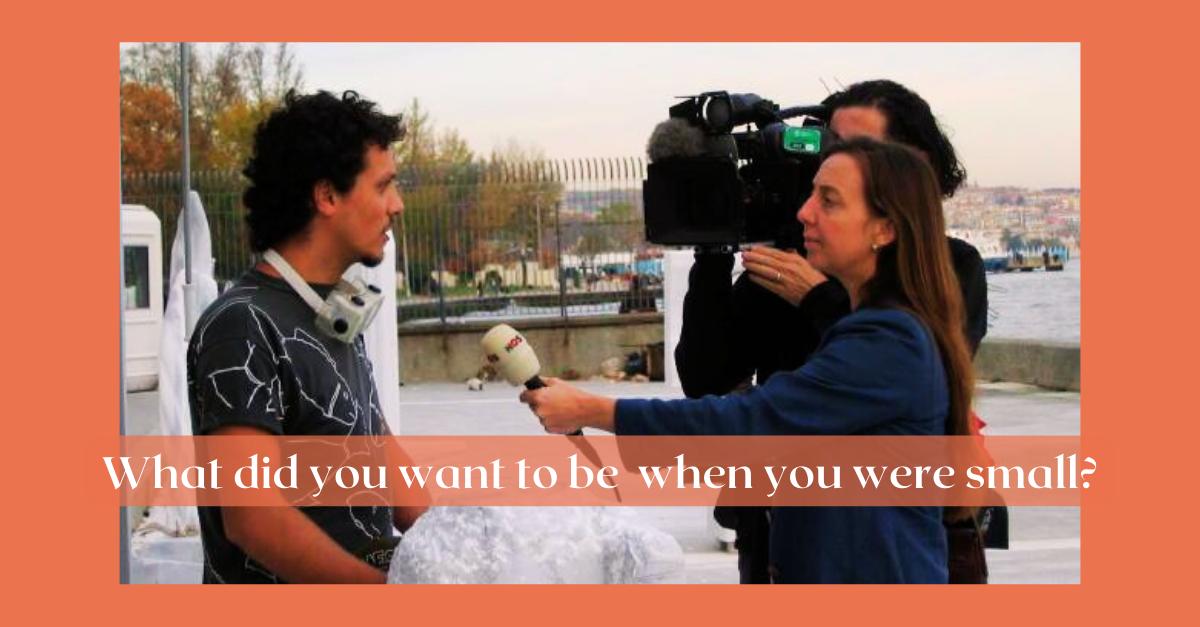Remember being asked when you were small, what you wanted to be when you grew up? Did you become it or did life take you elsewhere? How did you go about picking what you studied, or what you do for a living? And how does it match with what you feel your adult identity to be?
I remember wanting to be a vet around the age of 12, and shortly afterwards a hairdresser, because my best friend was leaving our brainy school to become that. The earliest time I contemplated the big question must have been around age 10. I drew my ideal grownup life as a house with a big garden full of wild animals, like tigers and lions. The whole complex could fly, so I could travel wherever I wanted, surrounded by my own safe space.
Ending up in Istanbul as a young consular attaché was travel alright, but never my childhood dream. Not counting the street cats, there were no wild animals, only millions of people. Covering the region full of conflict and disaster, which I subsequently did as a news correspondent for 20 years, was not exactly a safe space either. None of it was deliberately planned. And yet, it was one of the richest periods in my life I would not have wanted to miss.
On the other hand, from a young age on, I liked to write. My first ‘articles’ were published when I was 9. Writing has always been an essential part of my working life. But when, after leaving journalism, I pursued my teenage dream of being a novelist, I realized that wasn’t my (sole) path to fulfillment.
One thing
In the self-development world in which I currently work, we’re encouraged to find out what we really love doing. The idea being that work becomes something to eagerly jump out of bed for. A noble aspiration, since we spend such a big part of our life working. Why not make sure that it is something that keeps motivating us?
But what if there is not just one thing we love doing?
If you, like me, have a broad range of interests and want a change every so often, you may have felt inadequate at times for not being able to stick to one thing. You may have experienced how it started feeling as if you no longer knew what you want. Terrible for one’s morale, isn’t it?
I admit having been envious of those who don’t feel dread when they get questions like what they love doing most, what they’re best at, or how they see themselves 5 years from now, and then are able to make a plan to achieve that goal and live their dream life.
My failure to answer those questions turned out to be a blessing in disguise. My research into why I did not fit in the box, led me to discover my framework of We-Mind vs. Me-Mind. We’re all driven by our unique combination of these two, self-centered and other-centered thinking patterns, but we lead with one. Both are complex systems, with their own values, priorities, strategies, sources of conflict, definition of success and more. You can read a synopsis here.
Most importantly, our society tends to value the ways of the Me-Mind above those of the We-Mind. That is the reason why those of us who lead with our We-Mind struggle to meet expectations.
Growth
Once I gave myself permission to step away from the single, me-minded strategies, a world opened up. Over and over again, I come across new aspects of the difference between the two thinking styles. Getting to your dream life is yet another one of them.
For those of us who lead with their Me-Mind it’s easier to map out the path and stick to it. Our Me-Mind is all about getting ahead. Dominantly me-minded people grow professionally by advancing their careers. Growth for the We-Mind, however, is driven by connection, not just with people, but between ideas and experiences as well.
Goal-setting, planning, finding your life’s purpose are action-oriented. That’s what motivates our Me-Mind. Our We-Mind is more about being in the moment. What motivates it, are feelings that you contribute in a meaningful way, that you are recognised for what you do, that you have a sense of responsibility, or that you’re learning.
Both our minds contribute to the feeling of success, but, depending on which one leads, we need to approach achieving it from a different angle. The right strategy makes all the difference between motivation and procrastination, between willpower and self-doubt, between fulfillment and frustration.
If you are a leader who needs to motivate others, or could do with some new insights, direction and motivation yourself, please accept my invitation to further explore the topic during the next Meeting of Minds, on May 8th.
So, when did you last think about your childhood dreams? We’ll ponder this and more.
You can register here.

